Springing forward
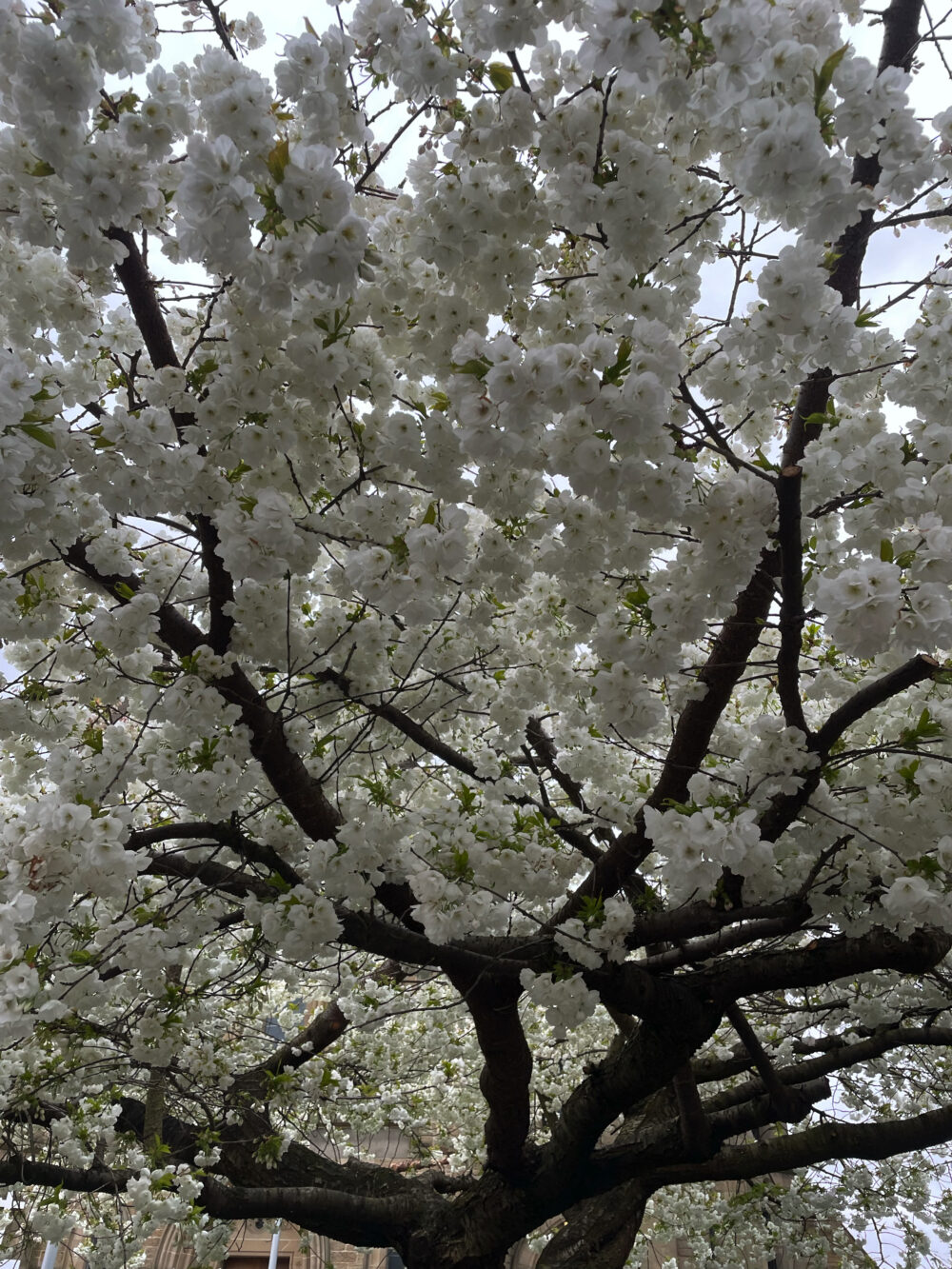
The blossom’s here and the clocks have sprung forward. Easter has arrived. Hope is in the air, growth and renewal are all around us, if we only let ourselves notice.
This post was filed under: Photos, Gosforth, Newcastle upon Tyne.

The blossom’s here and the clocks have sprung forward. Easter has arrived. Hope is in the air, growth and renewal are all around us, if we only let ourselves notice.
This post was filed under: Photos, Gosforth, Newcastle upon Tyne.

Seventeen years ago, I highlighted a BBC News article in which Dave Gilbert reflected on thirteen years of online news.
So much of what has come to pass since is unwittingly signalled in that article.
The shrewdest comments came from the newspaper advertising executives who wondered where the revenue would come from. It’s a question some are still asking.
In 2024, this question is posed more frequently than in 2007. Waves of news organisations have collapsed, having transitioned to a business model that siphoned their income to Google and Facebook.
We clocked very early on that it was about a global audience, audience response and encouraging feedback – Web 2.0 in fact.
The idea of ‘audience response’ feels so quaint in 2024, when many news articles are built around embedded Twitter quotes. Often, it feels like the commentary has become the news, in a way that I certainly never foresaw.
People buy newspapers for a host of reasons but reporters never know how many read their own stories. From our real-time statistics, I know exactly what the audience is reading, and the feedback is almost instantaneous.
I don’t think any of us quite understood the extent to which those statistics would come to drive the news agenda, ‘public interest’ playing second fiddle to ‘things that interest the public,’ even at the BBC. ‘Beyoncé’s country album: the verdict’ would not have been one of BBC News’s top stories in 2007, though it was yesterday.
The pace of cultural change is difficult to believe.
The image at the top of this post was generated by DALL·E 3.
This post was filed under: Media, Technology, BBC News, Dave Gilbert.
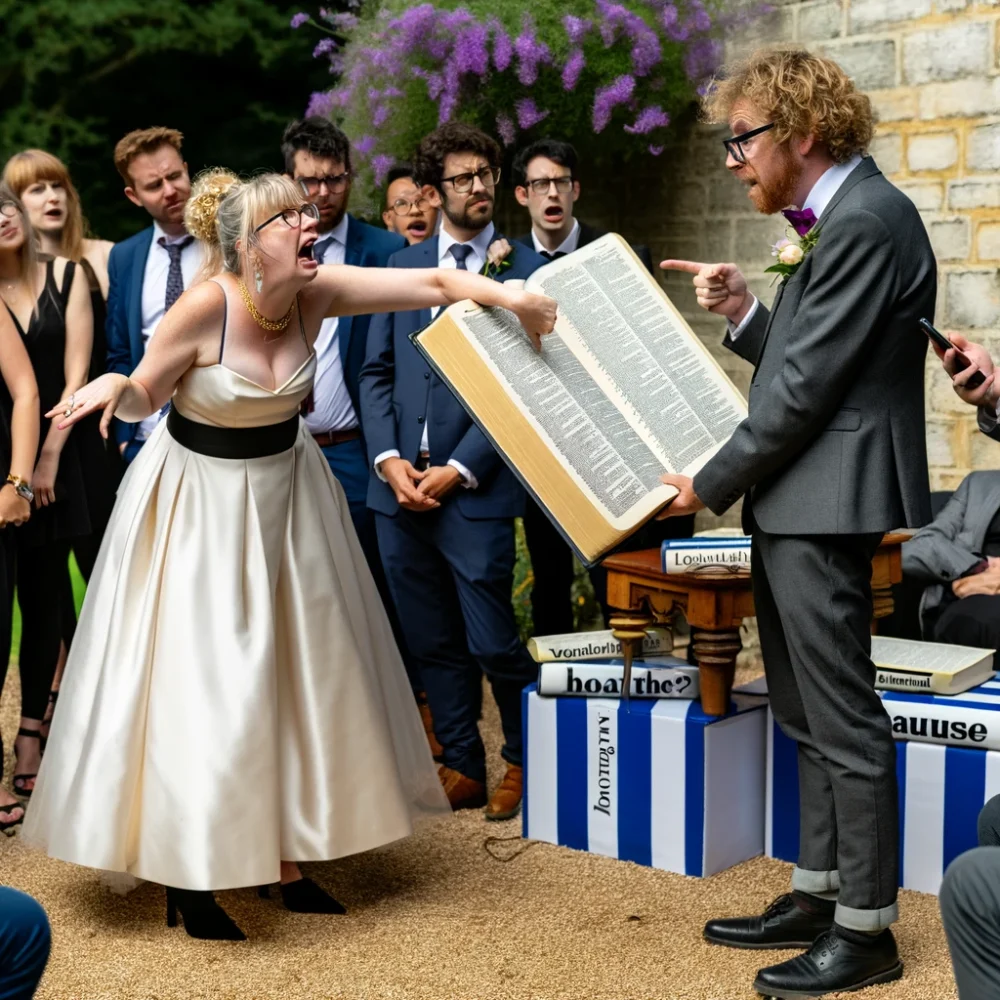
In the Microsoft Teams chat at work yesterday, I had cause to describe a task as loathsome. Typing this word caused a shuddering realisation, one that probably dawned on you many years ago: ‘loath’ and ‘loathe’ are really quite similar words. Many websites tell me that these two words are commonly confused, yet I’ve never noticed the similarity.
I ‘loathe’ (rhymes with ‘clothe’) really horrible tasks: I hate them, feel repulsion from them. I’m not willing to do things I loathe.
Things that are ‘loathsome’ cause me to hate them… such as really horrible tasks. It’s just ‘loathe’ plus ‘some’ to make an adjective.
On the other hand, I’m ‘loath’ (rhymes with ‘both’) to do things that I dislike: I’m reluctant, somewhat averse. I’d prefer not to, but I will if I have to. ‘For fairer, for loather’ used to be a line in marriage vows—which perhaps demonstrates how different ‘loath’ is from ‘loathe’. You’d hope nobody would consider their partner loathsome at their wedding.
How did we end up in this linguistic quagmire, where the adjective ‘loath’ means something quite different to the verb ‘loathe’? Quick, let’s crack open the Oxford English Dictionary.
Unsatisfyingly, any explanation is lost to history. The divergence in meaning probably happened 1,000 years ago or so. ‘Loathsome’ came into the picture in the 1300s, which suggests that the divergence had occurred by then, as something wouldn’t need to be described as loathsome if it could just be described as loath.
Apparently, ‘loathe’ is more than twice as common in modern written English as ‘loath’, which—given the more robust sense of negativity—strikes me as a sad indictment of our times. But I can hardly complain about that when my own use of ‘loathsome’ started me down this track.
So, let me defend myself. In the two-decade-, 3,000-post history of this blog, I’ve used the word ‘loath’ twice: I was loath to read a book about the pandemic and loath to criticise those who claimed that King Charles’s approach to monarchy was reflected in his haircut.
Yet, there’s only one thing I’ve ‘loathed’: I really had it in for the characters of Jane Austen’s Emma. Hmm.
The image at the top of this post was generated by DALL·E 3.
This post was filed under: Miscellaneous, Oxford English Dictionary.
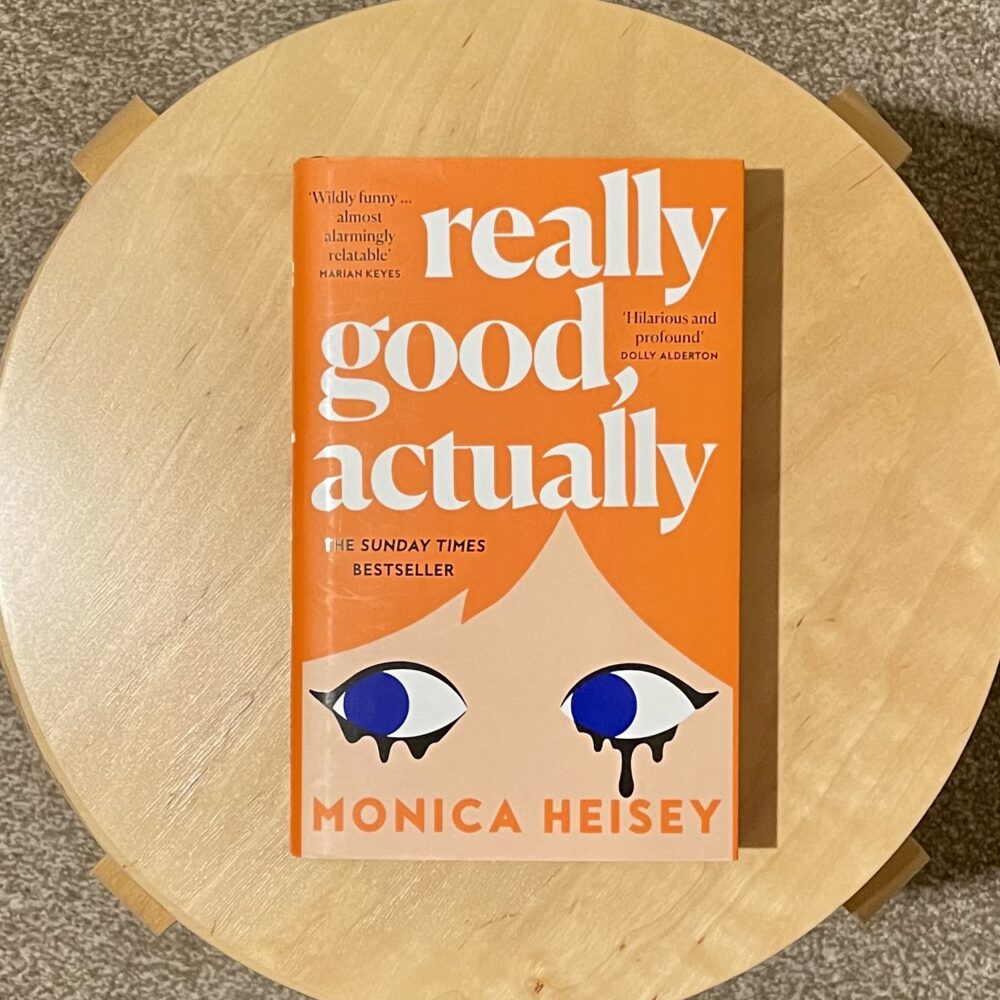
Published last year, Monica Heisey’s bestselling comic novel follows Maggie, a 29-year-old Torontonian PhD student, as her marriage ends. This really wasn’t for me.
There is precious little plot in this novel: it’s intended, I think, as a character study. However, the central character seems to be a collection of clichés rather than a believable person. She is endlessly self-centred and devoid of a sense of agency or responsibility. She is ‘extremely online’, forever worrying about her pictures on Instagram and dating apps. She capitalises Important Phrases. She is cartoonish.
Perhaps as a result, I didn’t feel any emotional connection to the book or its characters. It was all just a bit flat. There were some funny lines, but they didn’t add up to an engaging whole.
Here are some bits I highlighted:
The idea of Jon writing breakup songs in some dark sublet filled me with equal parts deep despair and incredible relief – despair, to think that I had caused him such pain he’d been driven to experimental songwriting; relief that I wouldn’t have to listen to it.
No adult starts a hobby from a good place.’
She was right. It didn’t matter if it was a buzzy new fitness trend or an aspirationally useful class or something fun and specific, like life drawing or an Italian conversation group – everyone involved in adult learning was running from something.
I looked beautiful in it, but walking down the aisle that day I still felt enormously stupid. What was I doing, veil or not, tottering around a church in a virgin costume in front of everyone I knew, toward a man I’d been living with for years? Why did we need to validate our commitment with this showy little stroll?
I told her getting divorced was like getting stuck in a blouse at Zara: I was struggling, and it was clearly the wrong fit, but maybe it would be more embarrassing to try to take it off, to come out of the dressing room and have to admit, I tried, but I couldn’t make it work. Maybe it would have been easier not to attempt extraction. Maybe I should have flung open the curtain and proclaimed it my favourite, insisted on wearing it out of the store and every day thereafter, laughing as it cut off the circulation to my arms
My feed was saturated with alluring images of expensive medical procedures that made women in their forties and fifties look ten years younger merely by cutting their faces off and sewing them back on higher up.
This post was filed under: What I've Been Reading, Monica Heisey.
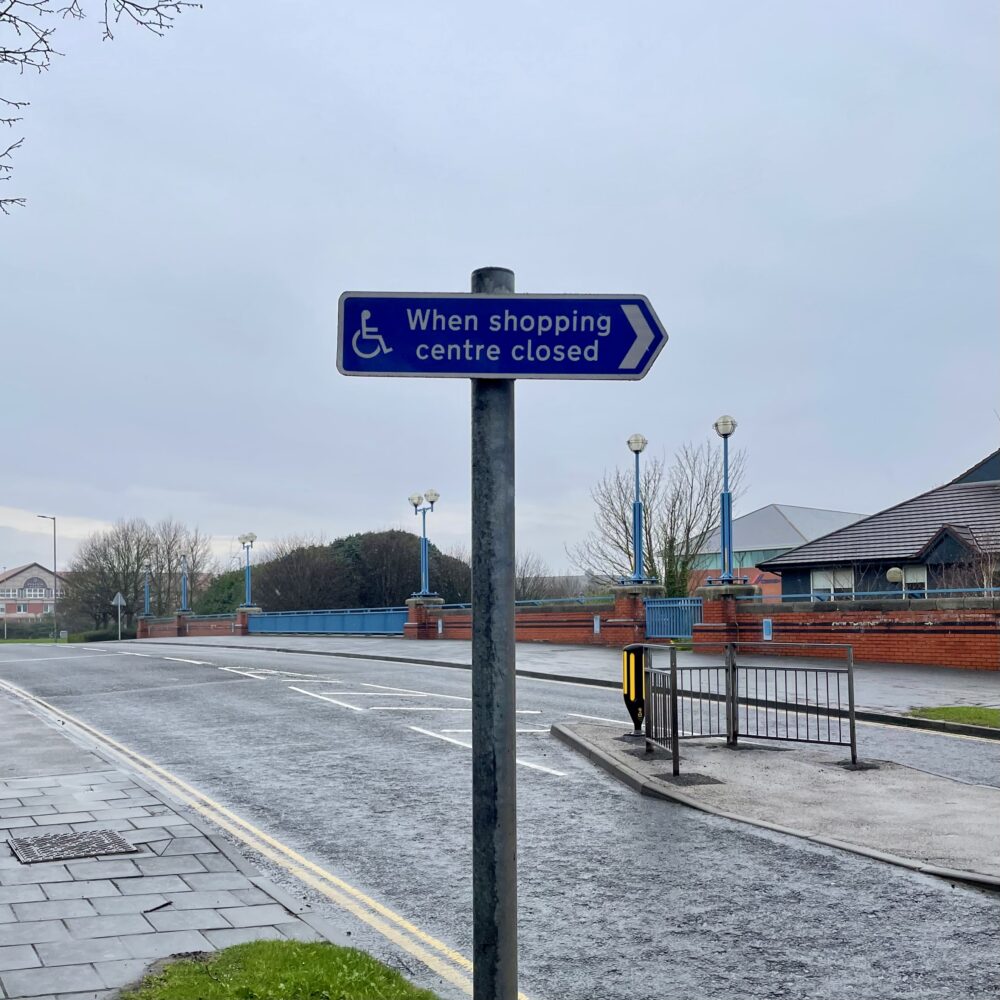
Just along the River Tees from the Princess of Wales Bridge, one finds the Teesquay Millennium Bridge—locally known as the ‘wobbly’ bridge. I trudged across this many times when I lived locally.
At its northern end, the bridge used to give onto the Castlegate shopping centre. The bridge was accessible to pedestrians, but not to wheelchairs, when the shopping centre was closed. This gave rise to the above unusual sign, roughly 250m away from the south end of the bridge, directing those with disabilities to use the aforementioned Princess of Wales Bridge.
These days, the Castlegate centre is no more. While the new Stockton Waterfront is under construction, the northern end of the bridge is disconcertingly dangling. Once it’s complete, the bridge will be extended to join it, and will—for the first time—be fully accessible at all times.
It was always the bit over the road that wobbled. I wonder if it will still wobble after the extension is constructed, or whether a new moniker will be needed.

This post was filed under: Photos, Stockton-on-Tees, Thornaby.
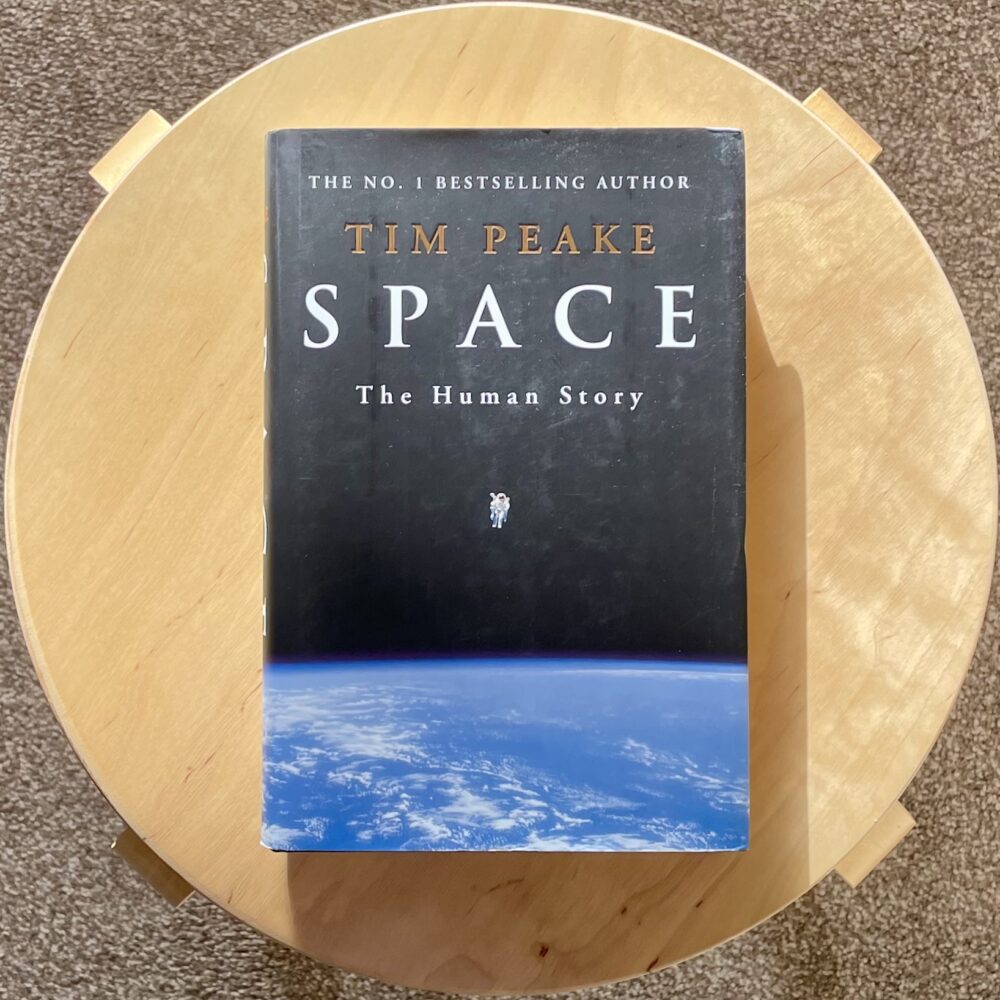
I received this book as a particularly well-chosen Christmas present, just a few months after I finished Tim Marshall’s excellent book The Future of Geography. While Marshall’s book considers space in geopolitical terms, Peake concentrates on the human experience of space flight, from the first cosmonauts to the current Artemis programme.
Peake’s experience in space means he can bring personal insights into much he discusses, and he’s also a great writer. It helps that his focus in this book is on humans, which means that it doesn’t get excessively bogged down in discussion of the technology of spaceflight, which I have sometimes found hard to follow in other books.
Rather than recounting the history of human spaceflight chronologically, Peake tackles it thematically. For example, the early part of the book covers the process of astronaut recruitment and selection, and Peake shows how this has changed over time. There’s a lot of social history woven through the narrative, which I felt added some extra interest. I found this an inspiring read.
Peake discusses the unique contribution that humans can make to space exploration. This section prompted me to reflect: in many areas of life, we’re used to considering how robots can replace humans. In spaceflight, the discussion seemed to start from the opposite point, looking for the areas in which the unique contribution of humans displaces the automatic assumption of using robots. With the expanding capabilities of artificial intelligence and automation becoming ever-more common, including in medicine, I wondered whether this might be a worthwhile thought experiment. If we assume that everything can be done by robots and algorithms, where can humans bring added value? I suspect the conclusions may be more nuanced and helpful than just thinking about which bits of a process can be replaced by automation. It’s an approach I might steal for future discussions about my own work.
I’ve read a fair amount about space exploration over the years, so much of this book’s content was already familiar. However, Peake’s enthusiasm and insight made for an enjoyable read, and his approach to telling the story highlighted areas I’d perhaps under-considered. I raced through this and would thoroughly recommend it.
This post was filed under: What I've Been Reading, Tim Peake.
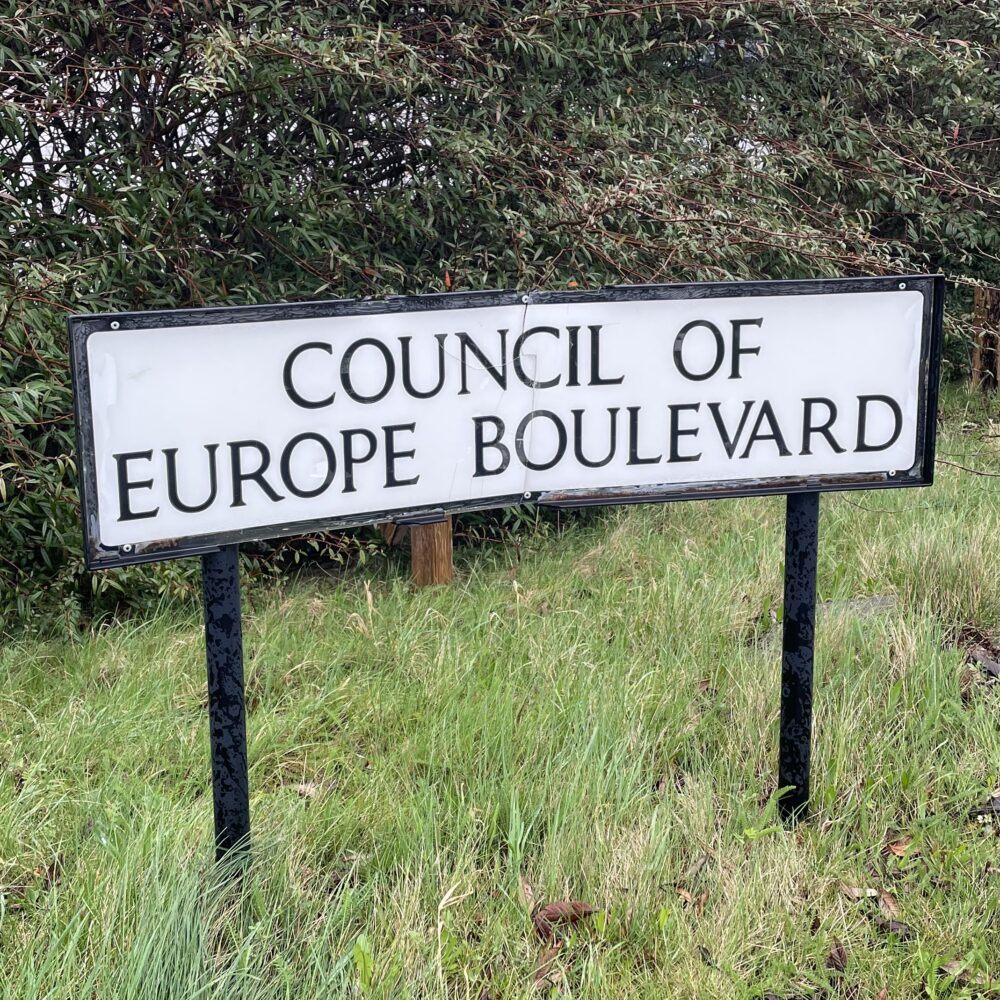
Council of Europe Boulevard is a road running between Stockton-on-Tees and Thornaby. It runs over the River Tees via the Princess of Wales Bridge, still locally known as the Diana Bridge. I had always assumed the bridge was named as a posthumous tribute, but in fact, it was named in 1992 and opened by the Princess herself.
But it’s the road I want to write about today. Until the late 1980s, it was called Trafalgar Street, but as the area began to set its sights higher and wider, it was renamed to reflect the spirit of European co-operation exemplified by the Council of Europe.
Over the coming years, the acknowledgement of Europe co-operation in a road name became ever-more relevant: Teesside became a huge net beneficiary of European Union funding, with hundreds of millions of pounds spent in the area even as national Government funding for the area dwindled. Indeed, the bridges immediately up- and down-stream of the Diana Bridge—the Millennium Bridge and the Infinity Bridge—were both built with European funding.
Yet, current Tees Valley Mayor Ben Houchen has said:
There is hardly a more prominent, but inappropriately named road in Teesside than ‘Council of Europe Boulevard’.
I struggle to follow his logic as to why the name is inappropriate. Given that the UK remains a member of the Council of Europe, the specific choice of name remains apposite even post-Brexit. Houchen has spoken at length about the importance of protecting Teesside’s heritage, and European co-operation remains a key plank of that heritage. One can’t even make a post-rational argument that the name was inappropriately ‘bought’, given that the Council of Europe and the European Union are entirely distinct entities.
Nevertheless, Houchen would prefer the road to be renamed again, this time after Stanley Hollis, a war hero with no connection to Stockton or Thornaby.
The Mayor of Thornaby, Steve Walmsley, disagrees: he has observed that a different war hero—Edward Cooper—was born in Stockton and lived in Thornaby. Cooper might therefore be the more obvious choice, but as Walmsley has acknowledged:
We should recognise these people, but this just seems a bit silly.
It’s hard to disagree.
This post was filed under: Politics, Stockton-on-Tees, Thornaby.
The Zone of Interest is Jonathan Glazer’s critically acclaimed, double-Oscar-winning, triple-BAFTA-winning adaptation of Martin Amis’s novel. It is a bona fide nailed-on success of British cinema that everyone who knows anything about film says you should watch. In this post, I’m going to tell you that I didn’t think it was very good, but I know nothing about filmmaking.
The film is set during the Holocaust in the area around the Auschwitz concentration camp. The central character is a fictionalised version of Rudolf Höss, the commandant of the camp. The film focuses on his domestic life in the family home next to the concentration camp, and the impact of his career progression on his family life. The viewer is never taken inside the camp, though we do hear atrocities being committed in the background of scenes, and see the rising smoke from the crematoria.
Let me first say that I streamed this at home, which was clearly not the best way to experience the film, as it translates poorly to a small screen and to TV speakers. The film often uses distant shots where the action is quite hard to make out on the small screen. The dialogue is German, and the subtitles (which are burned-in) were slightly too small to comfortably read. In many scenes, the contrast of the white text on a light background failed me. The sound design is hard to appreciate in this setting, too. If you’re going to see this, see it in a cinema.
I don’t usually engage with works of fiction about the World Wars, with some notable exceptions. I tend not to enjoy them: the totality of the experience of war is so difficult to capture that I often find them trite. I’m not therefore able to set this film in any sensible artistic context, which might mean that I’m missing a lot of what’s in it.
The film seemed to be making a point about ‘othering’. The family was portrayed as seeing Jews as a ‘problem to be solved’. The Jews who worked in the house were mostly ignored or were casually taunted in horrifying ways about the spreading of their ashes. This point was driven home by the mother-in-law character, who had a personal connection to a Jewish woman and who couldn’t hide her horror at events.
However, focusing on ‘othering’ in a context where such division is already institutionally enforced seems an odd choice. The narrative fascination with ‘othering’ typically lies in the transition into ‘otherness, a process glaringly absent here due to the pre-existing, state-imposed separation. If we accept that the Jewish community had already been ’othered’ by the state, then it somewhat lets the individual characters off the narrative hook in terms of not acknowledging the screams, the shots, the rising smoke.
It strikes me that it would have been better to use the setting to make a point about the universal nature of humanity, but this is weirdly excised. Living in a place surrounded by the sounds of atrocities would surely make people anxious about what if the screams were from this side of the wall? For example, if you were sending your children out to play in a garden where the background is gunshots and screaming, even if you’d blocked that out through continual exposure, surely you’d naturally worry that you wouldn’t hear your own injured child? And, surely, that would lead you to reflect on humanity? It’s strange that the chillingly mundane impact isn’t even observed, let alone explored.
This film doesn’t offer explanations, and nor could it: but if we take it as a work of fictionalised observation, it’s a peculiarly framed one.
Towards the end of the film, there’s a section of present-day footage of cleaners at work in the Auschwitz-Birkenau State Museum. This footage is haunting and emotive, but I think it’s entirely inappropriate to use footage of the site of death of thousands of people, as well as their personal effects, to lend emotional heft to a fictional piece. It felt immoral.
And maybe, in the end, this just wasn’t a film for me.
This post was filed under: Film, Jonathan Glazer.
It fucked up my life but I wasn’t upset. You know, they kept talking about “undergoing” surgery, “undergoing” chemo. It really bugged me. I never saw it that way. I was just living my life. I wasn’t “undergoing” it.
— Geoff Dyer, Yoga for People Who Can’t Be Bothered to Do It
I struggle to imagine how it feels to sit on a bench and record a statement telling the world about your cancer treatment, just weeks after hearing the news yourself.
But more even than that, I can’t begin to imagine what it’s like to get up in the morning and know that’s in your diary for the day; or for your family to ask how the filming went; or to go about your day as the news breaks in ripples all around.
It’s not something separate and distinct and different and cordened off; it’s part of life, and that makes it all the more difficult.
This post was filed under: News and Comment, Geoff Dyer.
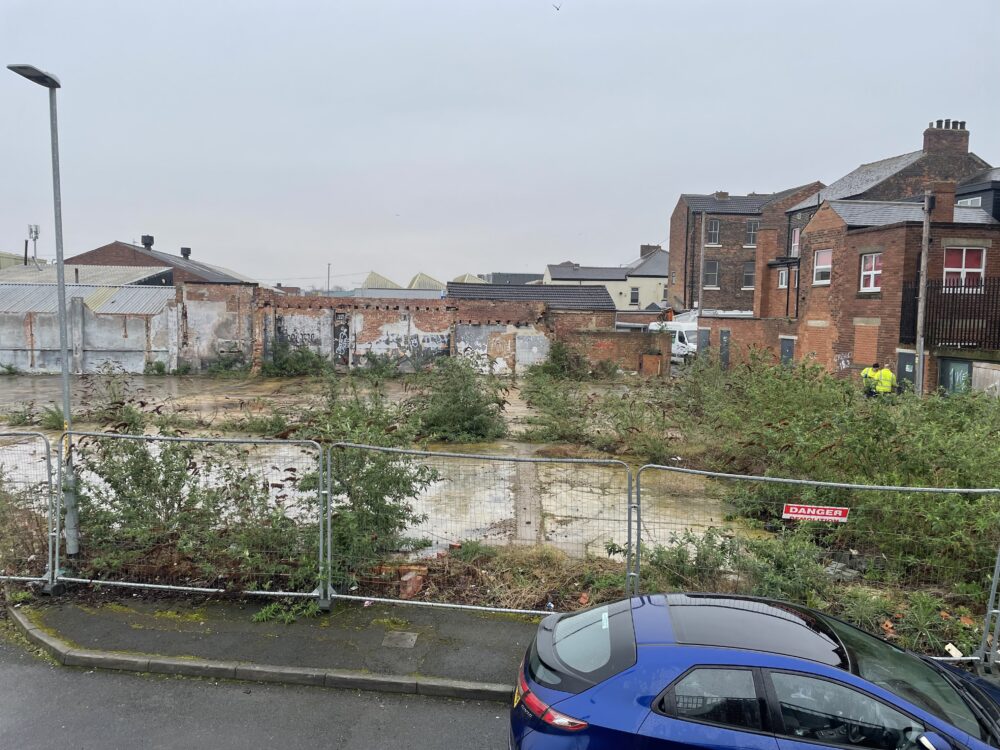
Twenty years ago, this piece of land near Thornaby station was home to The Rocket. This was the Students’ Union associated with Stephenson College at Durham University, where I started my medical degree… and where several of my fellow students performed a ‘full monty’ striptease for the local mayor. I’m not sure that would be a University-sanctioned activity in 2024. It feels more like an event that could lead to a political scandal.
I’m not certain when The Rocket closed, but it had been long abandoned and had suffered a large fire by the time it was torn down in 2021. It could hardly be called a rapid unscheduled disassembly.
It’s surprising how quickly things change, and also how quickly time passes.
This post was filed under: Photos, University, Durham University, Stockton-on-Tees, Thornaby.
The content of this site is copyright protected by a Creative Commons License, with some rights reserved. All trademarks, images and logos remain the property of their respective owners. The accuracy of information on this site is in no way guaranteed. Opinions expressed are solely those of the author. No responsibility can be accepted for any loss or damage caused by reliance on the information provided by this site. Information about cookies and the handling of emails submitted for the 'new posts by email' service can be found in the privacy policy. This site uses affiliate links: if you buy something via a link on this site, I might get a small percentage in commission. Here's hoping.